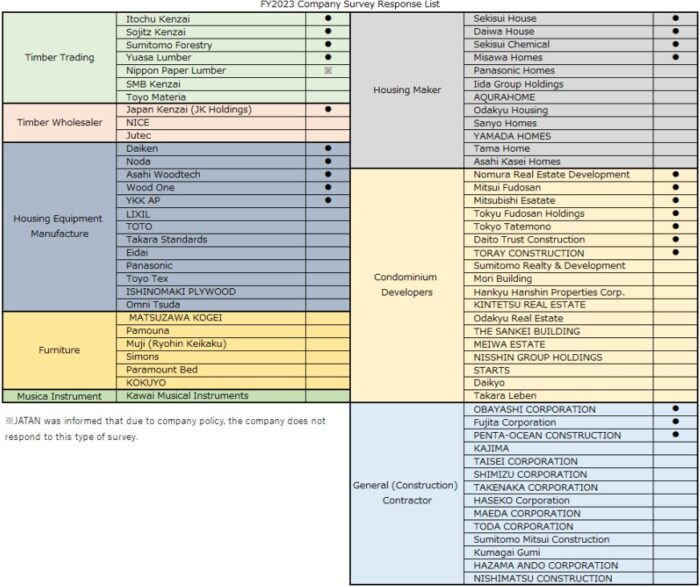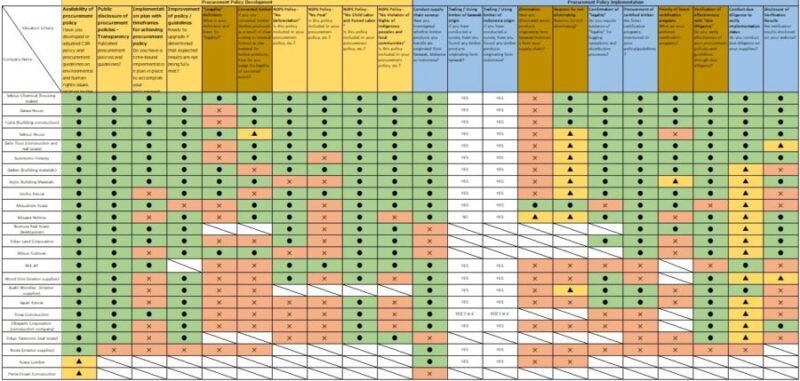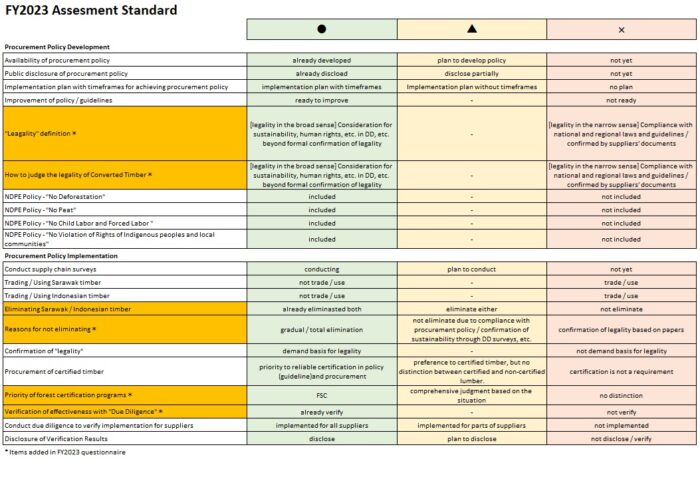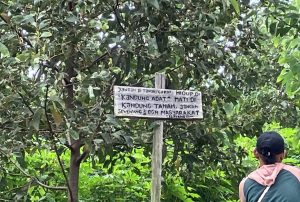Summary of FY2023 Company Questionnaire Survey Results on Procurement Policy and Supply of Timber Products Sourced from Indonesia and Sarawak
Analysis and Evaluation
Changes from the previous survey
The survey was conducted in February of this year. The previous survey was carried out from June to July 2022. Questions remained the same, but five new evaluation items were added.
While small and medium-sized companies engaged in flooring installation and building material selling were excluded from the survey, 13 general contractors were added to our questionnaire target list. As a result, more large user companies were included in the survey. In addition, companies that were newly identified as using Sarawak/Indonesian materials based on NGO reports and official Indonesian data obtained by JATAN were added to the list.
A total of 74 companies were surveyed in February, of which 25 responded. Nippon Paper Lumber informed us that they refrain from responding to questionnaires regarding the company's internal affairs according to its policy. Therefore, we conducted our analysis and evaluation based on the questionnaire results from 24 responding companies.

FY2023 Companies Responding to Questionnaire
【PDF】FY2023 Companies Responding to Questionnaire
Sarawak/Indonesian Timber
Misawa Homes indicated in the 2019 survey that they eliminated Sarawak timber. In this year's survey, we learned that Mitsubishi Estate has newly eliminated Sarawak/Indonesian timber. Both Daiwa House and Fujita responded that they would conduct risk assessments of Sarawak timber from the perspective of legality and sustainability, and would provide guidance to their suppliers to gradually eliminate Sarawak timber from their products. They also indicated they would take similar measures against Indonesian timber. Sekisui Chemical responded that they plan to eliminate Sarawak-origin timber in cases where problems are recognized with the "forest sustainability" of the origin, and that they are scheduled to achieve "total elimination" in FY2024 or later. While such risk assessment-based elimination is expected to become a major trend in Japan’s timber industry, many companies still stated that they would continue procurement as long as it is acceptable in light of their own procurement policies, as the reason for "not eliminating" such timber.
Definition and Basis of “Legality”
JATAN do not recognize that "legality" merely means compliance with the laws and regulations of the producing and receiving countries (legality in the narrow sense). UN Guiding Principles on Business and Human Rights, which impose on companies the responsibility to respect human rights from the perspective of international law, require companies to prevent or mitigate negative impacts on human rights in their business activities and to take action when negative impacts occur (Principle 13). The UN Working Group on Business and Human Rights conducted a study visit to Japan in July and August 2023. In their end-of-mission statement, the Working Group emphasized the need to incorporate a gap analysis of business and human rights policies, identify priority issues, and clarify the responsibilities of stakeholders. Furthermore, in the section on "Corporate Responsibility to Respect Human Rights," the working group admitted that “considerable gaps remain in relation to a variety of issues, including … their ability to monitor and reduce human rights risks in the upstream and downstream of their value chains”. These observation is premised on the challenge of identifying issues by scrutinizing and analyzing the negative impacts of companies on all stakeholders. It is imperative for companies to identify cases of human rights violations in their business activities and to ensure that they implement UN Guiding Principles on Business and Human Rights (UNGPs) for the victims.
In fact, the responses to our questionnaire also showed that some companies, such as Mitsui Fudosan, are even considering international codes of conduct (legality in the broad sense), and some companies "recognize that, especially in high-risk areas such as Malaysia, there are cases of illegal activities and forest sustainability problems even if they are in compliance with the laws of the country (Sekisui Chemical). On the other hand, there are companies such as Noda and Wood One who state "legality is based only on documents issued by the Indonesian government and the Sarawak state government”.
Forest Certification Priorities
A report published last year, LOST IN CERTIFICATION: How forest certification greenwashes Samling's dirty timber and fools the international market issued by Bruno Manswer Fonds and the Borneo Project, clearly shows that logging operations certified under Malaysian Timber Certification Scheme (MTCS), endorsed by Programme for the Endorsement of Forest Certification (PEFC), have a number of problems, including their failed complaint/grievance system.
FSC (Forest Stewardship Council) is “the only forest and forest product certification scheme that expects commitment to its core values by not only the certified companies, but also other companies who belong to the corporate group of a certified company”. (https://connect.fsc.org/system-integrity/policy-association)
Under the Policy for Association (FSC-PRO-10-004), “any stakeholder can submit a complaint if there is substantial information that an associated individual or organization or its corporate group is suspected of a violation of this policy”. Complaints are processed according to Processing FSC Policy for Association Complaints (FSC-PRO-01-009).
In 2022, FSC officially accepted a complaint against Malaysian timber giant Samling filed by civil society groups. FSC accepted the complaint after determining there was “sufficient evidence” regarding violation of FSC policies. FSC said it would open a case into alleged illegal logging, violations of traditional and human rights, destruction of high conservation value forests and significant conversion of forests as grounds for dissociation according to the Procedure for Processing FSC Policy for Association Complaints.
In November 2023, Mighty Earth submitted a complaint to FSC against two organizations belonging to the Alas Kusuma group in Indonesia – PT Mayawana Persada and PT Kusuma Alam Sari. The alleged unacceptable activities mentioned in the complaint are Conversion of natural forests into plantations, Destruction of high conservation values, Violation of human and traditional rights and Illegal logging or the trade in illegal wood or forest products. After reviewing the complaint, FSC decided to launch a case against Alas Kusuma according to the provisions of FSC Policy for Association version in December 2023.
PEFC does not have a Policy for Association. In addition to the evaluation item of whether the forest certification system is mentioned in their procurement policy / guideline, their answer to “Forest Certification Priorities “question was also added to our evaluation items.

FY2023 Company Ranking in Timber Procurement
【FY2023 Company Ranking in Timber Procurement】

Note: JATAN Company Questionnaire Survey was supported by the Patagonia Environmental Grants Program.


